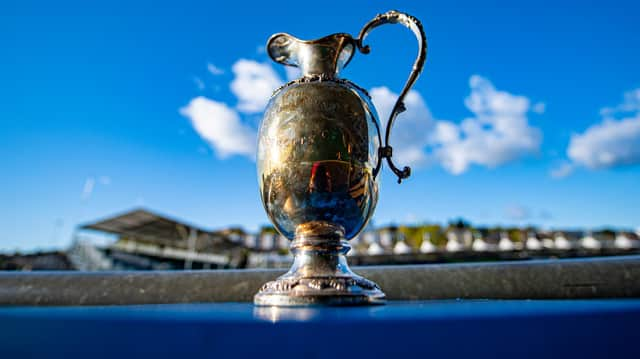No crowd is a shame but Glasgow v Edinburgh still promises excitement - Allan Massie


It’s not often that the Northern Ireland Government is to be praised for boldness and for what many would think good sense - given the suggestion that, on the scientific evidence available, the Omicron variant seems milder than previous forms of Covid. But the Scottish Government is being prudent and careful, or, if you prefer, a timorous beastie.
It’s a shame, especially since, given their recent form, the Glasgow-Edinburgh clash tomorrow promises to be compelling, both teams coming into it on the back of famous and well-deserved victories, Edinburgh narrowly beating Saracens at Allianz Park, Glasgow dominating Exeter Chiefs at Scotstoun to such an extent that the final score 22-7 didn’t quite reflect their superiority. Even if neither Saracens nor Exeter may be quite as strong as they were a year or two ago, these were notable triumphs.
Advertisement
Hide AdAdvertisement
Hide AdGiven that we still expect that five or six of the Scotland team that opens the Six Nations tournament against England will be drawn from clubs in England or France, the inter-city matches are not quite the version today of the old international Trials of the amateur days. Nevertheless many will see these games in that light, even though the clubs and their coaches won’t.
One of the surprising and very welcome features of these two victories was the set-scrum superiority of the Scottish sides. We have been more accustomed to coming off second best in the scrums, but, in both matches, the Scottish tight-head, Willem Nel for Edinburgh and Zander Fagerson for Glasgow, ruled the roost. One may be sorry that the set scrum is now usually regarded as a means of winning a penalty rather than of supplying quick clean ball to the backs, but there it is. That’s how the game has developed and how it is refereed now. This being so one could only be delighted to see the Scottish scrums so much in control.
Thick fog at Scotstoun made watching often a matter of guesswork, but one couldn’t but be impressed by the tackling and powerful ball-carrying of the Glasgow back-row: Matt Fagerson, Jack Dempsey and Rory Darge. Dempsey got the man-of-the-match award, but it might equally have gone to either of his flankers. Perhaps the younger Fagerson is more a 6 than an 8, the position he has normally occupied for both Glasgow and Scotland.
Undoubtedly one of the points of interest in these 1872 Cup games will be the battle of the back-rows. Jamie Ritchie and Hamish Watson have been outstanding for club and country, their place secure. Edinburgh’s Bill Mata will be missing, but both Magnus Bradbury and Nick Haining have played number 8 for Scotland. Now, challenged by Matt Fagerson and young Darge, both Ritchie and Watson will have to look to their laurels. Fascinating. I doubt if competition for the Scotland back-row has been so fierce since the 1980s.
Not even the Scotstoun fog could quite conceal the excellence of Ali Price’s game against Exeter. A couple of intelligent and promising attacking kicks took unfortunate bounces into touch-in-goal, but really he didn’t seem to put a foot wrong. His reading of the game was well-nigh perfect, his passing slick, fast and accurate. No doubt his self-confidence has been boosted by his emergence as the starting Lions scrum-half in the summer and by coach Danny Wilson’s decision to make him Glasgow’s acting captain in the absence of the club’s joint-captains, Ryan Wilson and Fraser Brown.
Edinburgh’s defeat of Saracens was the more remarkable because they were without three or four of what one might consider their best XV. Yet it wasn’t a surprising win – on reflection anyway. They are playing a more adventurous and varied game than last season. Richard Cockerill made Edinburgh a team that was often, even usually, hard to beat, but one that played limited and, to be honest, often dull rugby. His successor Mike Blair has instilled a different and more adventurous spirit. He himself was one of the best attacking scrum-halves Scotland have had in the professional era. As Frank Hadden, when Scotland coach, once said to me, “Mike makes things happen”. He is doing just that now from the bench or grandstand.
I look forward to these two cup matches. Given even half-decent weather they should be fun to watch. Just a pity there will be no crowd to give voice.
Get a year of unlimited access to all The Scotsman's sport coverage without the need for a full subscription. Expert analysis of the biggest games, exclusive interviews, live blogs, transfer news and 70 per cent fewer ads on Scotsman.com - all for less than £1 a week. Subscribe to us today
Comments
Want to join the conversation? Please or to comment on this article.